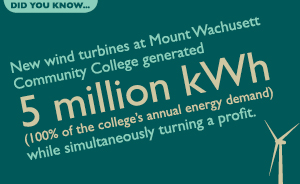By Ulrike Klein, Director of Operations and Communications, Second Nature and John Salak, President, The Salak Group
(This article appears in the April, 2012 issue of The ACUPCC Implementer)
The ACUPCC will celebrate Earth Day the entire month of April by profiling successful sustainability programs and activities at 15 colleges and universities. The Celebrating Sustainability series will demonstrate how effective our signatories are in building sustainable practices that have positive impacts on their campuses, students and surrounding communities.
 The month-long celebration will highlight a different success story for each business day in April leading up to Earth Day on April 22nd. The campaign was announced nationally at the end of March. Every profile will be supported by outreach to media outlets that matter most for the schools involved. The signatory success stories will also be identified on our ACUPCC Web site.
The month-long celebration will highlight a different success story for each business day in April leading up to Earth Day on April 22nd. The campaign was announced nationally at the end of March. Every profile will be supported by outreach to media outlets that matter most for the schools involved. The signatory success stories will also be identified on our ACUPCC Web site.
The profiles will cover a range of institutions in terms of size and location. They will also outline a wide array of success stories from Mount Washusett Community College’s drive to achieve near climate neutrality in operations thanks to the installation of two 1.65 MW wind turbines to UC Irvine’s launch of energy-saving Smart Labs.
Highlighting success in implementing sustainable practices is critical for all our signatories—not just the 15 we’re profiling in April. Colleges and universities need to promote their achievements to raise awareness and continued support for their activities on their campuses and in their surrounding communities.
Unfortunately, getting out the word on campus and off can be challenging. Most journalists have a soft spot for stories connected to protecting the environment. Administrators, faculty members, students and university marketing and public relation staffers also generally support climate control initiatives, green living and sustainable operations.
Yet being theoretically supportive doesn’t mean journalists or campus communities always understand the concepts behind “sustainability” or how an institution’s various initiatives and practices are making a difference on campus and in their surrounding communities.
The Celebrating Sustainability series is being run by Second Nature and The Salak Group—our marketing agency for the 5-year anniversary celebration of the ACUPCC. The campaign’s aim is to raise local and national awareness of how each signatory is implementing crucial sustainability programs on their campus or in their community. We’re also using the program to demonstrate the collective impact and importance of the ACUPCC’s work.
The campaign will specifically focus on developing local press interest and coverage of each of the signatories because that’s expected to have the greatest impact on raising awareness and generating support for the schools. This will be accomplished by targeting media outlets and journalists that regularly report on each school or its local community. To see an example press release from the series, click here :
“It is important to show the great work these colleges and universities are doing where it matters most—right on their campuses and in their neighborhoods. That’s why we’ll be working hard with each of these signatories to make connections with the local media,” explained Ulli Klein, the ACUPCC’s Director of Communications and Operations.
—
Make the Message Matter
1) Clearly identify your programs and what their impact is for your institution.
- Will your programs reduce operating costs and save money? If so, how much and when?
- Will programs reduce carbon emissions, other pollutants? If so, describe by how much and provide a meaningful comparison for the community and media.
- What other benefits are involved? Lifestyle benefits, a boost to the local economy, social engagements, community networking?
- Are students, faculty and your surrounding community involved? If so, how?
2) Brand your programs so they will engage or resonate with your target audiences.
3) Tackle one message at a time. We all suffer from information overload— especially journalists. Success demands providing one clear message at a time—a message that directly means something important to the community or the journalist.
4) Proactively engage your marketing and public relations departments and give them the information they need to successfully deliver your message of achievement.
5) Become an evangelist for your work. Be ready and willing to speak to journalists, students and alumni. Press releases and brochures only go so far.
